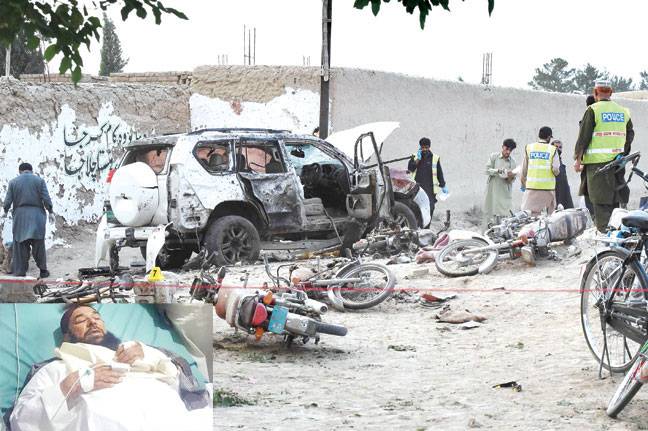QUETTA - A bomb exploded next to a convoy of Senate Deputy Chairman Abdul Ghafoor Haideri on Friday in Mastung, killing at least 27 people and injuring many more.
Islamic State claimed responsibility for the bombing outsider a seminary, 47 kilometres from Balochistan capital Quetta, where Haideri had gone to distribute graduation certificates among students.
“There are 26 casualties reported so far in Mastung blast,” Mastung Assistant Commissioner told The Nation.
Another victim was reported to have succumbed to injuries later at hospital. Rescuers and medical sources said at least 35 people were wounded in the blast. Ten of them were in serious condition, said a district health official, Sher Ahmed Satakzai.
A local government official and District Police Officer Ghazanfar Ali said that it was a suicide bombing and the attacker came riding a motorcycle and blew himself up close to Haideri's vehicle.
The senate deputy chairman, who is a top leader of the Jamiat Ulema-e-Islam-Fazl (JUI-F), received minor injuries from smashed windscreen but some of his close associates were not so lucky.
Haideri’s senatorial Principal Secretary Iftikhar Mughal, his driver and a guard were among the casualties. Naib Amir of JUI-F Quetta, seven JUI-F volunteers and a cop of Anti-Terrorist Force were also killed in the attack.
Survivors, several covered in blood, were seen picking up body parts that lay scattered in the road among vehicles twisted by the powerful blast.
Paramilitary troops and a bomb disposal squad were deployed outside the nearby madrassa, where Pakistani, Afghan, Chinese and Bangladeshi flags were hung - showing the nationalities of students – ahead of the ceremony.
“It was a suicide attack and the vest of the bomber carried 10-12 kg explosives,” said Bomb Disposal Squad officials Sajad Ahmed and Ghulam Muhammad who inspected the site and collected evidence.
Senator Abdul Ghafoor Haideri, the deputy chairman of the upper house of parliament, told Reuters minutes after the explosion he believed he was the target and he had sustained minor injuries. "There are many casualties as there were many people in the convoy," he said by telephone.
Most of the injured, including Haideri, were initially taken to Nawab Ghaus Bakhsh Memorial Hospital in Mastung, from where some of them were shifted to Quetta Civil Hospital and CMH.
"I am alive, Allah has saved my life, it was a sudden blast, broken pieces of the windscreen hit me, I am injured but safe. The driver [who later died] and other people sitting next to me were badly injured," Haideri told a private TV channel.
Haideri is a top official of JUI-F, one of the country's most powerful religious political parties.
The JUI-F has been targeted by the Pakistani Taliban in the past - even though the party leaders are thought to have connections in both Afghan and local Taliban groups and have acted as negotiators between the militants and Pakistan government on several occasions.
In view of Mastung blast, the JUI-F cancelled two-day visit of party chief Fazlur Rehman to Quetta and announced staging countrywide protests against the bombing from Sunday.
IS, also known as Daesh, does not have significant footprint in Pakistan yet this terror organisation with assistance of Taliban and other local militant outfits have been able to stage a number of attacks in the country.
Amaq news agency of the terrorist group said a bomber wearing an explosive vest carried out the attack. "A martyrdom-seeker from the Islamic State targeted with his explosive vest a convoy of the deputy chairman of the Pakistan Senate, Abdul Ghafoor Haideri, in Mastung district, south of the city of Quetta," the group said.
Balochistan Chief Minister Nawab Sanaullah Zehri talked with Haideri via telephone and inquired after him. He directed provincial police chief Ahsan Mehboob to submit report of the blast within 24 hours.
The chief minister said the government will compensate the victim families in accordance with the policy of provincial government and bear all the medical expenses of the injured.
The country has been battling Islamist and nationalist insurgencies in mineral-rich Balochistan since 2004, with hundreds of soldiers and militants killed in the fighting.
Overall security in the country has improved since a crackdown on militancy began in 2014, but a fresh wave of attacks that left more than 100 people dead in February has increased pressure on the government and the security forces.
Bordering Iran and Afghanistan, Balochistan is the largest of Pakistan's four provinces where the security forces have been battling Islamist and nationalist insurgencies since 2004, with hundreds of soldiers and militants killed in the fighting.
Roughly seven million inhabitants of this mineral-rich province have long complained they do not receive a fair share of its gas and mineral wealth. However, a greater push towards peace and development by the authorities has reduced the separatist and religious violence considerably in recent years.
The push includes starting work on a massive Chinese infrastructure project - the China Pakistan Economic Corridor - which gives Beijing a route to the Arabian Sea through Balochistan's deep sea port of Gwadar.
A US drone strike killed Taliban leader Mullah Akhtar Mansour last year in Balochistan.
The province was rocked by a series of attacks late last year that claimed over 180 lives and raised concerns about a growing militant presence.
A judicial report released after an attack on the province's lawyers left more than 70 dead criticised security provisions in the region and called for increased clampdowns on extremists.






